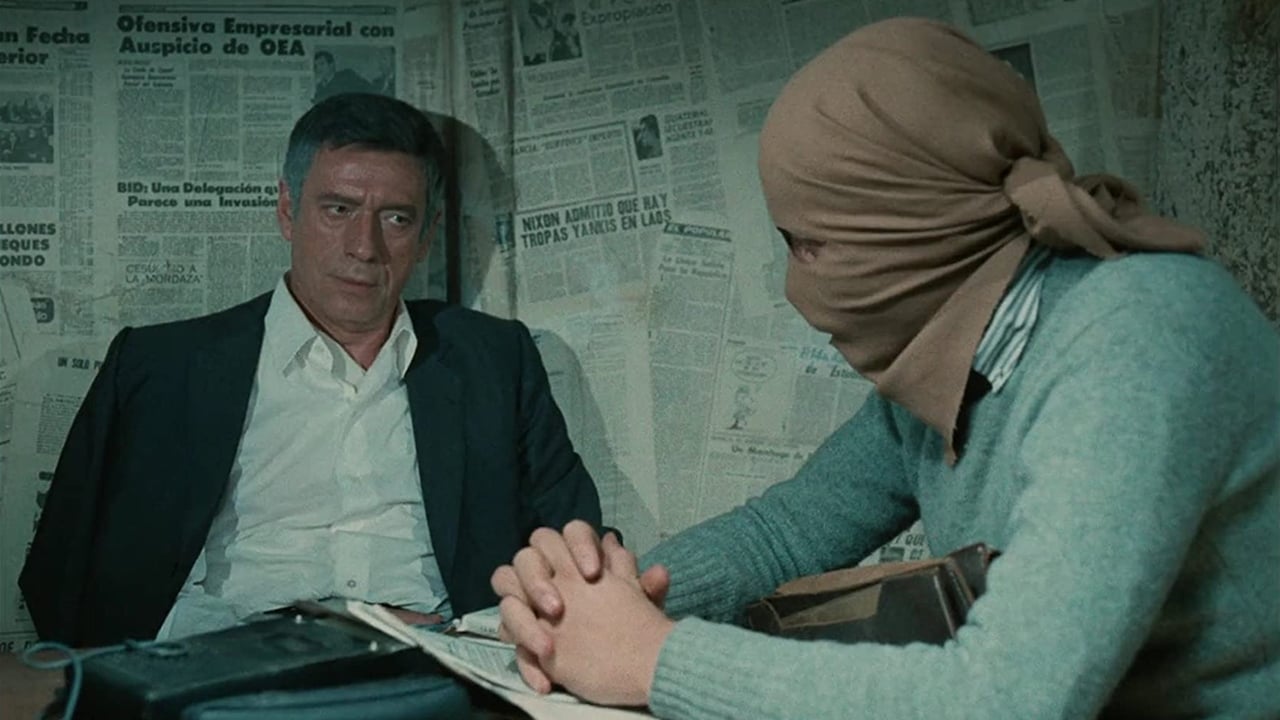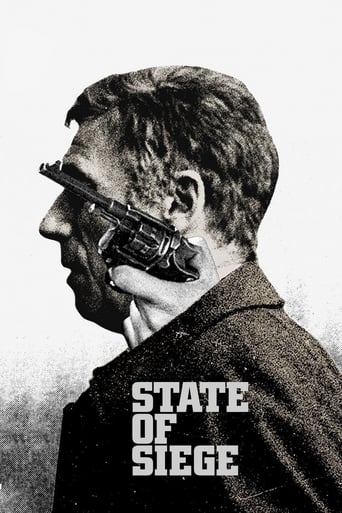

In the early 70's, in Uruguay, the revolutionary group Tupamaro kidnaps an American trainer of torture and the Brazilian consul, and through the interrogation of the abducted American, the big picture of Uruguay (and other Latin America countries) is reported."État de Siege" is a testimony of the history of Latin America in the 70's, during my childhood and adolescence. All the democratic governments elected by people were discharged through coup d'état by military dictatorships supported by the American government, the police and military forces trained in tortures by American advisors, student and union leaderships destroyed and revolutionary groups unsuccessfully fighting against the dictatorial regime. The fantastic director Costa Gravas exposes this serious wound in Latin America and this denunciation shall never be forgotten by the next generations. This movie remains amazingly real and important, sometimes recalling a documentary. Only this month this film was released on DVD in Brazil, and it is a worthwhile investment. My vote is ten.Title (Brazil): 'Estado de Sítio" ("State of Siege")
... View MoreI agree that this film should be released on DVD. It is a great companion piece to Z and Missing.Costa-Gavros managed to produce a stinging indictment of US involvement in South American politics, without drawing his villains as caricatures. His characters, policemen and revolutionaries, come off as profoundly human, flawed but not themselves monsters, though they are involved in monstrous acts. The torture scenes are grueling, and were probably as responsible for the film's official reception.I saw this at the age of 15, when it was in the theaters. I confused it with the Eric Ambler novel of the same name. It had a profound personal influence on me. I was able to rent it once, about 15 years ago but haven't run across it since.
... View MoreIn May, 2002 they are fulfilled 30 years of the beginning of the filming of this movie in several leases of Chile (Santiago, Viña del Mar, Valparaíso and Playa Ancha). It was in the second year of the socialistic government of the President Allende and the tension that is perceived in the movie was the one that already was living through the country a year before the military coup of 1973. The Chileans only we could see this movie 2001 and in an alone cinema-art in Santiago that exhibited it for two weeks. In May, 2002 the channel of French cable TV5 exhibited "State of Siege" four times, which has allowed a deeper critical review and to recognize a series of places of the Chile of 30 years ago, which already do not exist or which are now deeply modified. Besides the climate of the epoch there is perceived the precarious or simple car equipment that Chileans were having in that epoch in which the cars of luxury were the Dodge Dart Chrysler (assembled in the northern port of Arica) and the Peugeot 404 (assembled in Los Andes, 100 kms. from Santiago). The car of the well-off middle class was the Fiat 125 and en their juvenile sectors the ideal was a Mini Austin 850. In the installed middle class there were meeting old Renault 4S (the "renolas" o "renoletas"), VW beetles, Simca 1000 and principally the popular one Citroen 2CV, known like "citroneta" o "citrola". The movie allows to see brief the juvenile or young faces of approximately 30 actors, the majority today mature and well known and to wonder for the identities of others that probably retired, they did not come back from exile or were murdered or disappear during the dictatorship. In short an intelligent and nervous "thriller", in "Z" style, which showing the hard political reality of Uruguay between 1970 and 1972. The film allows a nostalgic look and indicative on the Chile that was on the way to disappear due the Coup d'Etat of 11 of september, 1973.
... View Morethis movie lacks a bit of focus , but the photography , the music , the concise dialogues make it quite an experience , maybe the only thing that does not convince me is the fact that we see a French -speaking latin-american country , anyway anyone who wishes to know about what happened in almost all south america , will find a great movie. I would like to point the fact that this movies was censored for being very radical due its left-wing tendencies .
... View More